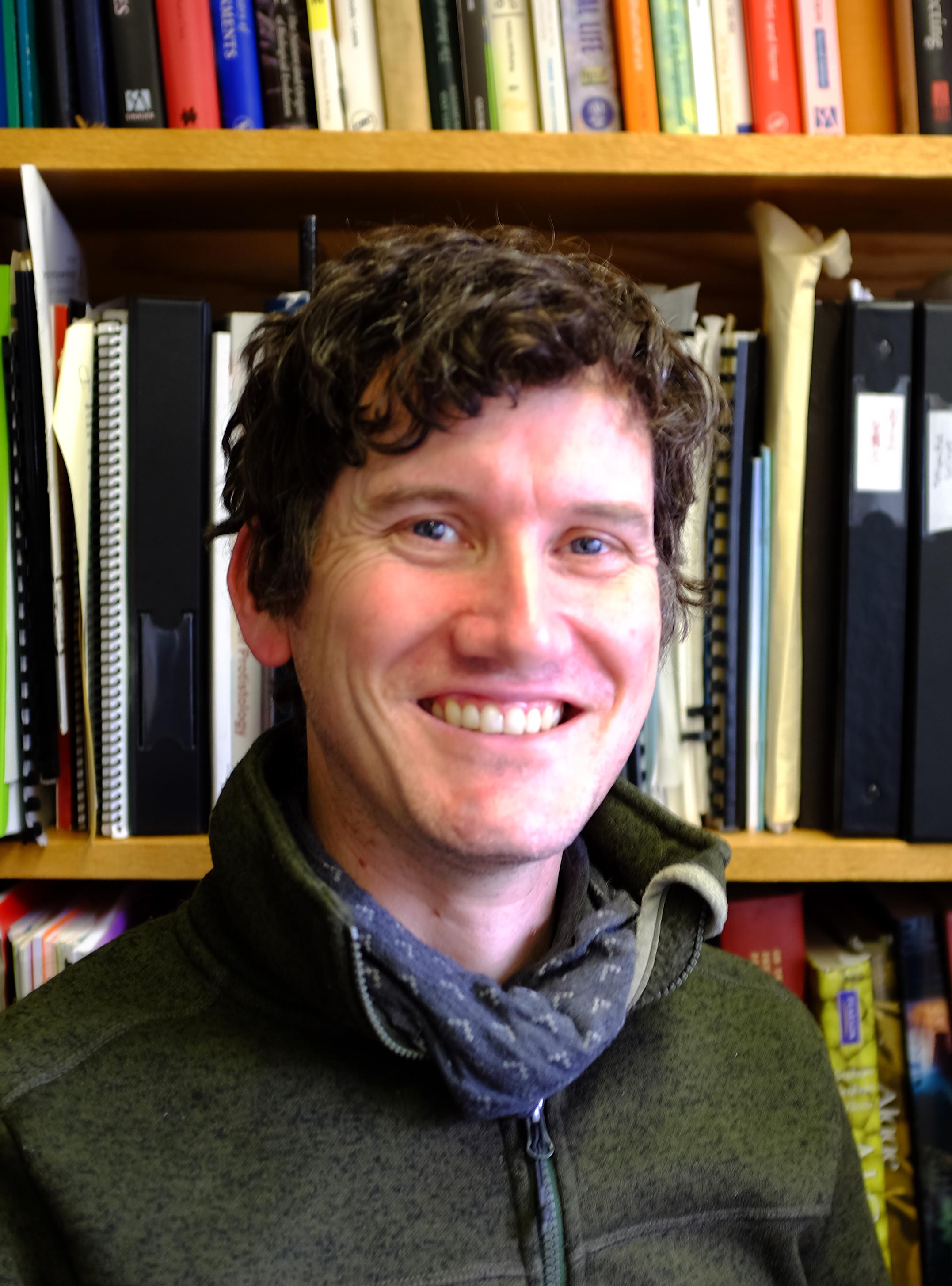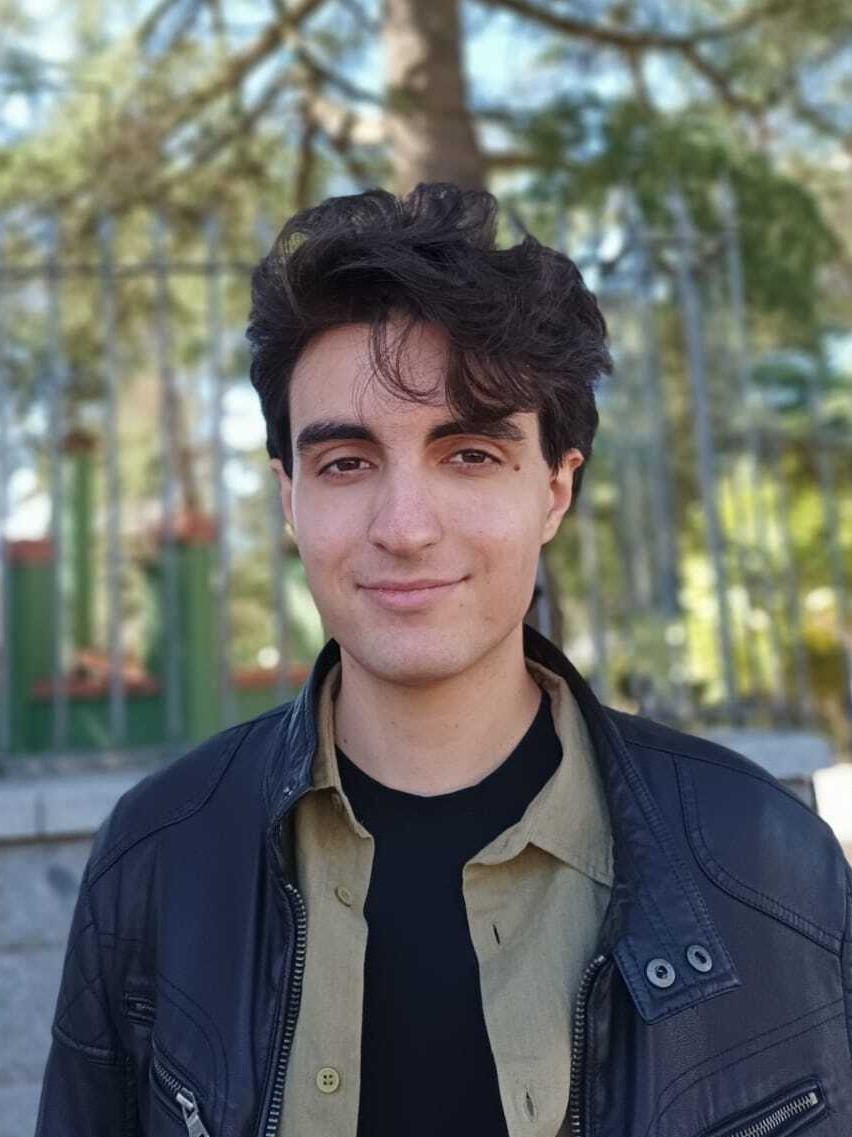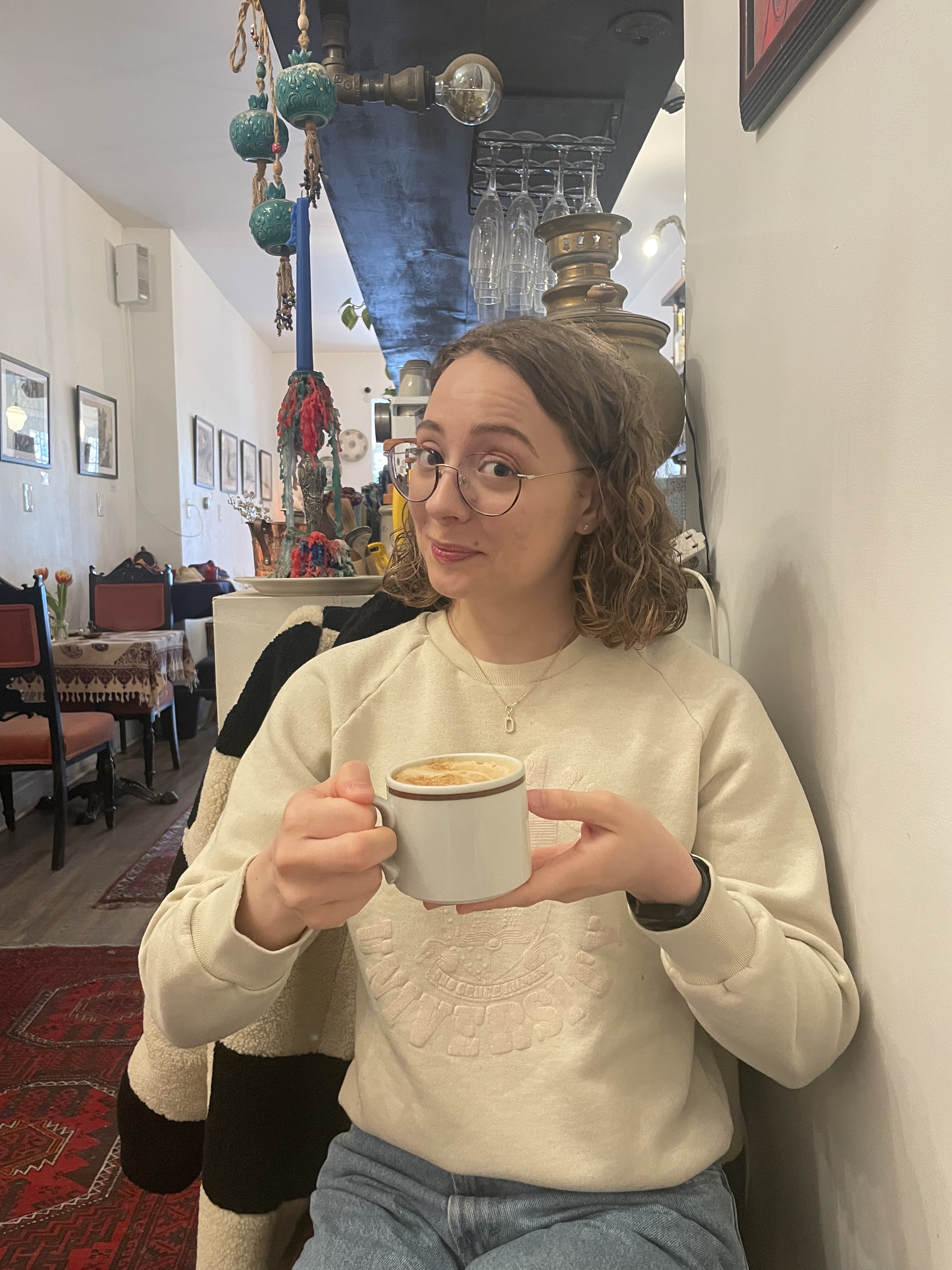
Alastair G.B. Simpson
& % +1 902 494 1247Alastair is a Professor in the Department of Biology at Dalhousie University.

Liz Weston &
Liz joined the lab in 2021 as an honours student, where she characterised an unusual eukaryotrophic flagellate with an unclear phylogenetic position. Now, she is a PhD student using electron microscopy techniques to reconstruct the ancestral feeding mechanism of flagellates (the excavate groove).

Guillermo (Will) Díez&
Will joined the lab in 2025 as a PhD student, after completing his Master's thesis in arcellinid testate amoebae at the Royal Botanical Gardens of Madrid, Spain. He is now studying the ultrastructure of various grooved flagellates and mysterious protists, in an effort to elucidate early eukaryotic evolution.

Julia ( Jube ) Packer & '
Jube joined the lab in 2023 as an honours student (and Faye Sobey Memorial undergraduate summer research student). During her honour's, she characterised a free-living kinetoplastid, which, surprisingly, contained a Gram-negative bacterial endosymbiont. Now, she is currently doing a master's degree in the lab, and is characterising three deep-branching heterotrophic flagellates in collaboration with Dr. Eglit (see below).
Meredith Rose
Meredith will be joining the lab as an honours student in fall 2025.
Seamus Berger-Smale
Seamus will be joining the lab as an honours student in fall 2025.
Co-supervised Trainees
Kelsey Williamson
Kelsey is a PhD student co-supervised by Andrew Roger (Department of Biochemistry and Molecular Biology) and Alastair Simpson. She is working on inferring the root of the eukaryote tree, and characterizing the genome of the deep-branching protist Hemimastix (see Lax, Eglit, Eme et al., 2018).
Former Lab Members (selection)
Yana Eglit &
Yana defended her PhD in December 2022. She isolated numerous free-living protozoa that had not been cultivated before, many of which were anaerobes and/or extremophiles and/or obligate predators of other eukaryotes. They included many of previously uncertain evolutionary affinities, such as Hemimastix (Lax, Eglit, Eme et al., 2018), Meteora (Eglit, Shiratori et al., 2024), some barthelonids (see Yazaki et al. 2020) and the formerly unknown skoliomonads (Eglit et al. 2024). In addition to extensive light microscopy and rDNA phylogenetics, she undertook phylogenomic analyses of Meteora and of an undescribed group of anaerobes, based transcriptome sequencing, and electron microscopy characterisations of several taxa. Yana was then a postdoctoral fellow at the University of Victoria, B.C. Canada, and in 2025 moved to a postdoctoral position in Geneva, Switzerland.

Gordon Lax
& 'Gordon's PhD research was molecular examination of the biodiversity and evolution of phagotrophic euglenids, a diverse group of single-celled eukaryotes abundant in marine and freshwater sediments. His work, primarily using single-cell molecular methods linked with photo-documentation, has dramatically altered and improved our understanding this assemblage of microbes (Lax et al. 2019, Lax and Simpson, 2020, Lax et al. 2021). He was also performed single-cell transcriptomics and phylogenomic analyses that established the 'deep-branching' status of Hemimastigophora (Lax, Eglit, Eme et al., 2018). Gordon completed his PhD in 2020, and is now a postdoctoral fellow in the Keeling Lab at the University of British Columbia

Sebastian Hess &
Sebastian received his doctoral degree in Cologne (Germany), where he investigated the structure, life histories and evolution of diverse, poorly known protists that feed on freshwater microalgae, such as the Viridiraptoridae, a family of cercozoan amoeboflagellates that perforate algal cells to feed on protoplast material. He came to Halifax as a postdoctoral research fellow co-supervised by Alastair Simpson and Andrew Roger (Department of Biochemistry and Molecular Biology)to study the molecular mechanisms involved in the complex feeding behaviour of viridiraptorids; for example cell wall degrading enzymes and actin-binding proteins, using comparative transcriptomic approaches and biochemical methods. He also characterized a bizarre amoebozoan protoplast feeder that swims as a toroid, using a rotating eukaryotic flagellum (Hess et al. 2019). Sebastian now has a research group at the Technical University of Darmstadt, Germany.
Andra Bugler &
Andra joined the lab in 2023 as an undergraduate student. She is characterizing several excavate flagellates using electron microscopy and molecular phylogenetic approaches.
Adriana Jenkins &
Adriana joined the lab in 2023 as an undergraduate student (and NSERC USRA-funded summer research student). She helped determine the hair structure and organisation of a heterotrophic stramenopile using electron microscopy techniques.
Daniel Ng &
Daniel was an experiential learning student who studied the growth and feeding preferences of predatory flagellates.
Kate Barkhouse &
Kate was an honours student (and NSERC USRA-funded summer research student) who described and characterised a halophilic flagellate, Ancyromonas melba, using a combination of molecular biology approaches and electron microscopy. Kate is now in medical school at the University of Western Ontario.
Lexi Hall &
Lexi was an honours student in 2020-2021, examining with diversity and phylogeny of petalomonads, an evolutionarily pivotal group of phagotrophic euglenids.
Andrea Gigeroff &
Andrea was an honours student (and NSERC USRA-funded summer research student) who studied a series of novel predatory flagellates that are suspected to be colponemids (an evolutionarily important group of Alveolatea). Working with Yana Eglit, she was successful in isolating several into di-eukaryotic predator-prey cultures, inferring their phylogenetic relationships, and examining their predatory behaviour. This work is now published (Gigeroff et al. 2023). Andrea then did an MSc in herpetology, and is now a PhD student at Laurentian studying invasive garter snakes in Newfoundland. But we forgive her.
Kiran More &
Kiran was an honours student (and NSERC USRA-funded summer research student) who worked with Sebastian Hess to examine the biodiversity and prey preference in algae-eating marine vampyrellids, including new species of Placopus ('Hyalodiscus') and a 'new genus' subsequently named Sericomyxa. The two papers from his honours research have now been published (More et al. 2019, More et al. 2021).
Tommy Harding &
Tommy was a PhD student in the Roger Lab at Dalhousie University, and co-supervised by us. He studied the adaptation to extremely high salinities in halophilic protozoa, using Halocafeteria and Pharyngomonas as models. Analysis of their transcriptomes (and the genome of Halocafeteria) revealed how these obligate halophiles have adapted to extreme environments with respect to gene content, gene expression and the amino acid composition of their inferred proteome (Harding et al. 2016, 2017). He also led work to confirm the life cycle of Pharyngomonas (Harding et al. 2013). Tommy is now a Forensic Biologist at the Laboratoire de Sciences Judiciaires et de Médecine Légale in Quebec.
Jiwon Yang &
Jiwon was a MSc student in the Roger Lab at Dalhousie University, and co-supervised by us. Working with Tommy Harding, she sequenced the mitochondrial genomes of the deep-branching Heterolobosea Pharyngomonas and 'BB2', discovering a fascinating novel system of insertional RNA editing in BB2 (Yang et al. 2017)
Robyn Buchwald &
Robyn graduated with her BSc with honours in Marine Biology at Dalhousie University in 2014, then completed her Masters in the Simpson Lab (and co-supervised by Robert Scheibling) in 2016. Her research involved Paramoeba invadens, a pathogenic amoeba causing mass mortalities of the common green sea urchin along the Atlantic Coast of Nova Scotia. During her Masters research Robyn developed and applied a gene-based PCR/qPCR assay to monitor Paramoeba invadens populations in the environment (Buchwald et al. 2018). Robyn is now in veterinary practice.
Claire Burnard &
Claire is an honours student, examining the biodiversity of halophilic ciliates, and especially testing an hypothesis of biogeographic isolation within the obligately halophilic Trimyema species complex.
Joshua Goodwin &
Joshua graduated with his BSc with Honours in Biology in May 2014 and continued his work in the lab under a Sarah Lawson Research Scholarship. Joshua characterized a novel kinetoplastid, Allobodo, that is a parasite or necrotroph of the invasive ulvophycean alga Codium fragile. Joshua demonstrated that this organism was in fact distinct single species, and that it holds an important phylogenetic position within metakinetoplastids. This work was published in 2018 (Goodwin et al. 2018).
Will Kirby &
A former undergraduate student & volunteer in the Simpson Lab, Will then went to undertake a Masters at the University of Alberta. In his time in the Simpson Lab, Will examined environmental samples from solar salterns, which led to the isolation and characterization of a new species of extremely halotolerant heteroloboseid, Tulamoeba bucina (Kirby et al. 2015).
Aaron Heiss &
Aaron examined deep-level eukaryote evolution from morphological and molecular phylogenetic standpoints. His major work was the detailed characterisation of the cytoskeleton of apusomonads, breviates, ancyromonads and malawimonads, poorly studied protozoa that appear to be important ‘deep branches’ in the eukaryotic tree, along with phylogenomic analyses based on transcriptome data (Heiss et al. 2011, 2013a, 2013b, 2018). He completed his PhD in 2012.
Martin Kolisko &
Martin's PhD research focused on the biodiversity and molecular phylogeny anaerobic excavates (e.g. Carpediemonas, retortamonads, diplomonads and enteromonads), and the impact of data from new Carpediemonas-like organisms on eukaryote phylogenomics, and on understanding the evolution of mitochondrion-like organelles in anaerobes. Martin was co-supervised by Andrew Roger in the Department of Biochemistry and Molecular Biology. He defended his PhD in 2011, then completed postdocs with Andrew Roger, and Patrick Keeling (UBC), and is now a principal investigator at the Institute of Parasitology, Czech Republic.
Jong Soo Park &
Jong Soo joined the lab as a postdoctoral fellow in 2007, following a PhD at Seoul National University with Prof. Byung Cheol Cho, and a postdoc in Chonnam University. Jong Soo worked primarily on the biodiversity and biogeography of halophilic and extremely halophilic protozoa. He also examined halotolerant heterotrophic stramenopiles and performed detailed electron microscopy studies on two Carpediemonas-like organisms. Jong Soo left the lab in 2011 to take up a faculty position at Kyungpook National University, South Korea.
Vladimir Hampl & '
Vladimir started his postdoctoral fellowship in 2006 (co-supervised by Andrew Roger, Department of Biochemistry and Molecular Biology), after he finished his PhD at Charles University in Prague. His research is focused on the phylogeny and mitochondrial evolution of Metamonada (Oxymonads, Trimastix, Carpediemonas, parabasalids, retortamonads, diplomonads). Vladimir returned to a faculty position in Prague in 2007.